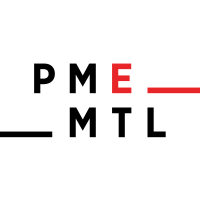“Buy less, buy better”. These words summarize Vincent Marceau’s philosophy behind his creation of the Nil Apparel line of durable, timeless sweats and tees.
The Fast Fashion phenomenon emerged about twenty years ago. It started out with the production by the fashion industry of four collections a year. Over time, the number of collections has continued to rise. Just look at how many stores proudly advertise new arrivals every week!
To counter this trend and in communion with the Slow Fashion movement, Vincent Marceau launched Nil Apparel in 2016. The company specializes in manufacturing very high quality, 100% organic Indian cotton sweatshirts and tees that the founder and designer describe as “frill-free and designed for everyday life”.
Every aspect of Nil Apparel’s production is done in Montréal, from the knitting of the fabrics to the final assembly. This choice is part of a desire to revitalize the Chabanel district, promote Montréal's expertise in clothing and stand out from an industry that, for the most part, outsources its production to Asia.
Reversing a worldwide trend
“We now consume 80 billion new pieces of clothing every year, four times more than 20 years ago,” says the entrepreneur, quoting the 2015 documentary The True Cost, which takes a close look at Fast Fashion. “This is a universe that pushes the cult of beauty to the limit, that values appearances and that creates temporary trends to stimulate consumption. However, behind all this, there is one hard fact: the clothing industry is the second most polluting industry behind the fossil fuel industry.” Another revealing statistic: the average American generates 82 pounds of textile waste each year.
Pollution is not just plastic in the oceans and oil in the air.
In response to Fast Fashion – also known as Disposable Fashion – Vincent Marceau offers sweatshirts and t-shirts with no designs, logos or messages. Emphasizing classic colours, this clothing is not made in those ephemeral shades that are in vogue today, only to be seen as outdated in just a few months.
The choice of organic fibres is also based on a green concern, as the cotton production industry alone is responsible for 18% of worldwide pesticide use and 25% of total insecticide use. Yet cotton accounts for only 3% of all cultivated land.
In a spirit of consistency, Nil Apparel has also entered into a partnership with L’Atelier Retailles for the recovery and recycling of the scraps from its textile cuts. This company transforms textile scraps into unique handmade paper, thus restoring a new useful life, without the use of new resources, to waste that would otherwise go to a landfill.
“Pollution is not just plastic in the oceans and oil in the air,” says Vincent Marceau. “People are beginning to pay attention to how their eating habits and their homes affect the environment. However, clothing is another necessity to consider, just like food and shelter.”

Interest outside Québec
In addition to selling online from its website, Nil Apparel has signed distribution agreements with a dozen retailers and boutiques that share Vincent Marceau's values. As a sign of consumer receptivity, sales for the brand over the past six months have exceeded sales for the previous 12 months. And starting next fall, it will be present in Toronto, Ottawa, Sudbury and British Columbia under recent agreements.
The garment industry is the second largest polluter, and the average American generates 82 pounds of textile waste annually.
Although he currently specializes in tops, the founder plans to add accessories such as socks or caps next year, with the same desire for durability and environmental sustainability. “Ultimately, I would like to offer a complete range of clothing (jackets, shirts, etc.) that never goes out of style.”
A company based on his own values
When he started out, Vincent Marceau mainly worked in communications-marketing and advertising; his career was not aimed at the clothing sector. “Gradually, I realized that I often had to push the consumption of products that did not correspond to my values. At the same time, I came across a few articles about the social and environmental impacts of fashion. When I saw that there was a way to make a concrete contribution, I went for it.”
It was during the start-up phase that he came to PME MTL to increase his cash flow to pay for future raw material orders while maintaining a certain volume of inventory. However, the group's assistance went beyond simple funding since Vincent Marceau benefited - and continues to benefit - from strategic support. “Since my organization revolves essentially around me alone, it is important to be able to count on outside help in areas such as financial forecasting and logistics. I am more of a marketing and creative man, and PME MTL provides me with management tools that help out on the business side.”
Nil Apparel is supported by PME MTL Centre-Ouest.
